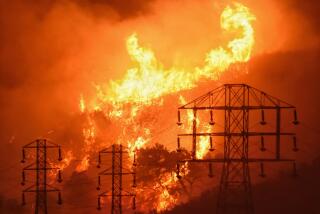Lawmakers’ Drive to Draft Energy Bill Comes Up Empty
- Share via
WASHINGTON — An energy bill that grew out of California’s electricity crisis and became one of President Bush’s domestic priorities quietly died in Congress on Wednesday.
Republicans, who will control the House and the Senate in the next Congress, pledged to revive the measure when lawmakers convene in January.
But with time running out on this year’s lame-duck session, Democratic and Republican negotiators had too many issues left to resolve. One key sticking point was whether the measure should require utilities to generate more energy from alternative sources, such as sun and wind.
In the end, the negotiators reached bipartisan agreement on one point Wednesday: No compromise measure was going to emerge this year.
A spokesman for Rep. W.J. “Billy” Tauzin (R-La.), chairman of the House Energy and Commerce Committee, expressed optimism that next year “an even better and bigger bill” will be approved.
“We have a roadmap in place after months of very difficult negotiations,” spokesman Ken Johnson said. “We know where the hairpin turns are located. We expect a lot smoother ride in 2003.”
But Democratic Sen. Jeff Bingaman of New Mexico, chairman of the Senate Energy and Natural Resources Committee, was more pessimistic.
“The political will to act did not match the rhetoric of the past two years on the need to address looming problems, such as electricity reform, natural gas supply, and our increasing thirst for foreign oil for transportation,” he said.
“I think the task of coming up with a comprehensive approach to energy policy, absent a major crisis, will only grow more difficult in the next Congress,” he added.
But the bill’s demise pleased some.
California officials had strongly objected to a provision that would have required ethanol to be added to gasoline, contending that it would increase fuel prices.
Environmentalists complained that the bill was heavy on production and short on conservation. “We’re thrilled” by the deadlock on the bill, said Carl Pope, executive director of the Sierra Club.
But J. Jon Doggett, vice president of public policy for the National Corn Growers Assn., said he was “very disappointed” by the stalemate. He called the bill a “victim of politics” and of “many interests competing against one another.”
Doggett’s group strongly backed the bill’s provision on ethanol, which is produced mostly from corn.
White House spokeswoman Claire Buchan said Bush hopes to see comprehensive energy legislation “high on the agenda” when Congress returns next year.
“We made good progress this year,” she said. “The president believes that it is an important issue that Congress needs to address immediately upon returning next year.”
Bush, a former oilman, seized on high energy prices nationwide and California’s electricity crunch to unveil an energy bill in May 2001 that stressed the need for more domestic oil and gas exploration.
The measure’s controversial elements included Bush’s call for opening up a portion of Alaska’s Arctic National Wildlife Refuge for drilling.
Despite these and other disputes, lawmakers in both parties embraced the need for a major bill that would decrease U.S. reliance on foreign oil.
But enthusiasm for the energy bill waned after California’s electricity crisis and gasoline prices eased.
Expectations were further lowered when the Democratic-led Senate rejected Bush’s Arctic refuge drilling proposal, and the House and Senate failed to approve tougher vehicle mileage standards that environmentalists wanted.
The elimination of both those major initiatives from the bill lessened the incentive for Republicans and Democrats to reach agreement on a final measure.
Still, competing versions of energy bills passed by the House and Senate ran hundreds of pages and included a number of other measures, such as tax breaks for conservation and energy production.
But in the end, lawmakers decided it was better to have no bill than one that would make a modest dent -- if even that -- in the nation’s dependence on foreign oil.
“Our country needs a strong, farsighted energy bill,” said Rep. Henry A. Waxman (D-Los Angeles), one of the measure’s critics, “This isn’t it.”
Tauzin made a last-ditch effort to get the Senate to pass a stripped-down bill that would include a pipeline safety measure and extend a cap on the nuclear industry’s liability in accidents, a provision designed to remove an obstacle to expansion of nuclear power plants.
Senate negotiators rejected that, although a separate pipeline safety measure still may be approved by the House and Senate today.
Republicans are still hopeful that Bush’s popularity and a possible war against Iraq will increase support for future White House energy proposals.
But even next year, with Republicans in control of the House and Senate, Bush will face difficulty winning approval of opening the Arctic refuge to drilling. That proposal is certain to face a filibuster by Democrats that would be difficult to overcome.
More to Read
Get the L.A. Times Politics newsletter
Deeply reported insights into legislation, politics and policy from Sacramento, Washington and beyond. In your inbox twice per week.
You may occasionally receive promotional content from the Los Angeles Times.











